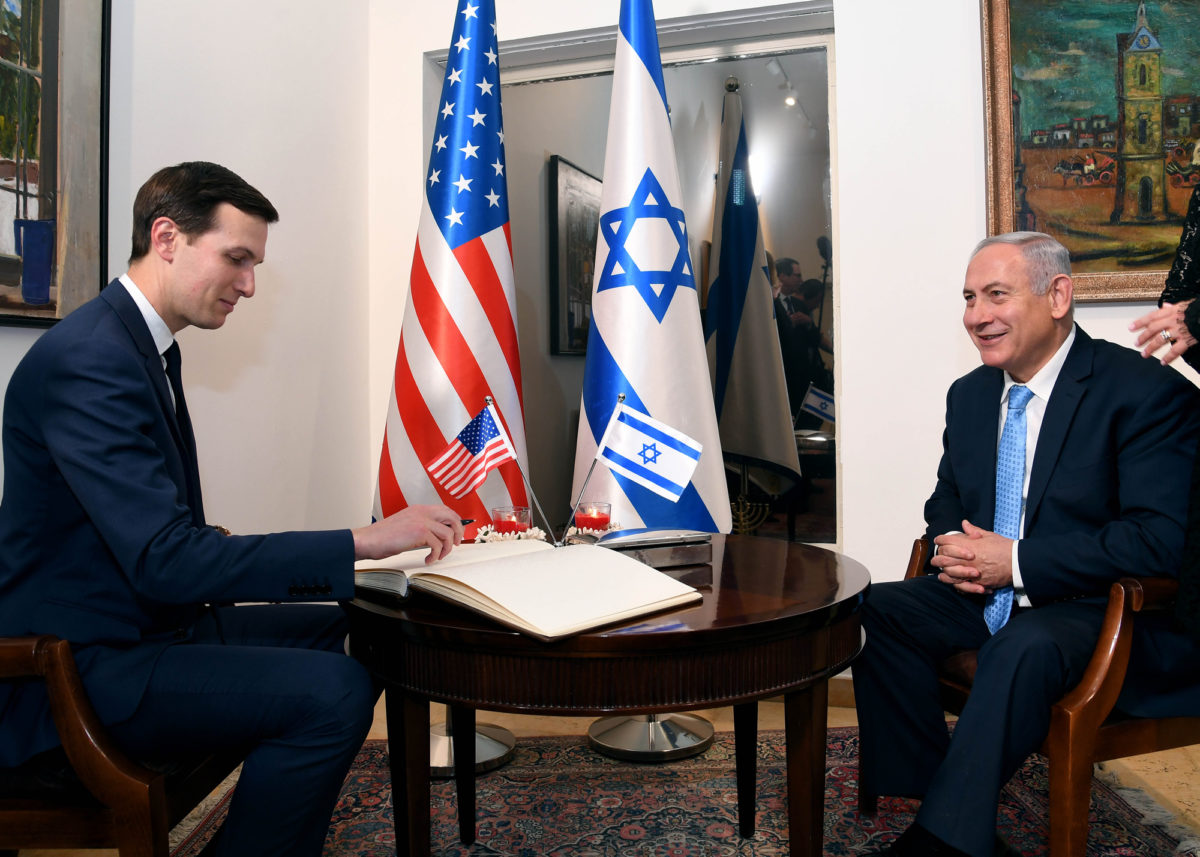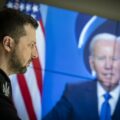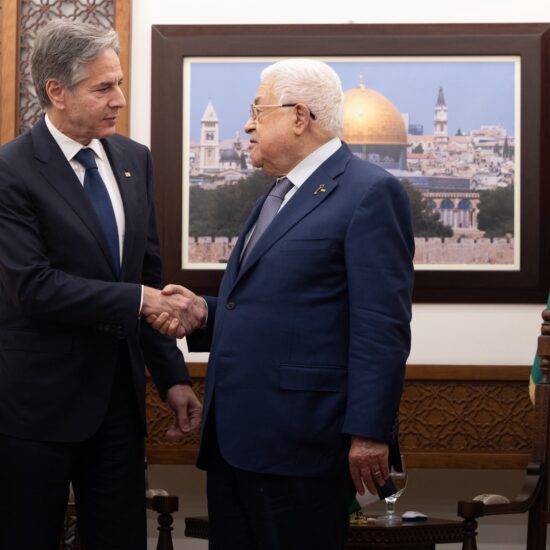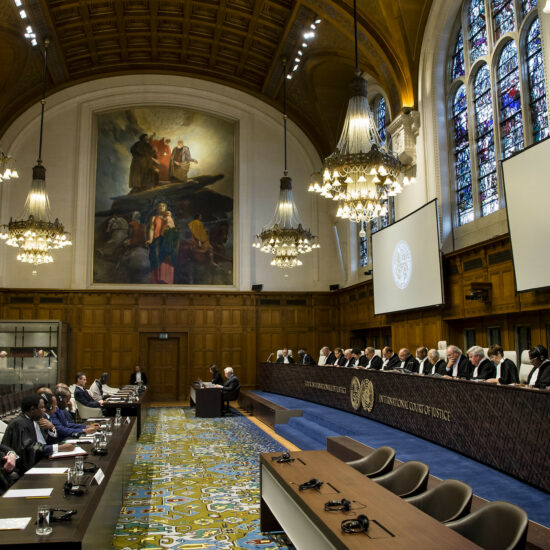
Embassy Dedication Ceremony, Source: U.S. Embassy Jerusalem, May 13, 2018
This plan is no longer a settlement policy, long deemed illegal by the international community. Instead, it is simply a massive territorial takeover based on a plan, which neither has international legitimacy nor legality, based on the countless, albeit ineffective United Nations resolutions on the Middle East Peace Process.
Ferry de Kerckhove, Former Canadian Ambassador to Egypt
Israeli Prime Minister Benjamin Netanyahu, in the midst of his corruption trial, has decided to initiate the illegal expansion of Israeli sovereignty in the West Bank as early as July, taking advantage of both the enhanced indifference of the international community due to the global pandemic and the one-sided policies of the US President Donald Trump.
Inspired by the White House support, Netanyahu believes that there has never been a more auspicious time in the country’s history to enshrine the sovereignty of the “Hebrew state” through an accelerated uptick of annexations.
With the recognition of Israel’s claim to Jerusalem as its undivided capital confirmed by the move of the US Embassy, as well as the recognition of the Golan Heights of Syria as Israeli territory, the Trump administration has developed the most unfavorable disposition towards the Palestinians of all modern US administrations.
On the Israeli side, this plan is no longer a settlement policy, long deemed illegal by the international community. Instead, it is simply a massive territorial takeover based on a plan, which neither has international legitimacy nor legality, based on the countless, albeit ineffective United Nations resolutions on the Middle East Peace Process. And make no mistake; those annexations would not even grant Israeli citizenship to the Palestinians being enclaved into the territory they would be deprived of.
People must revisit the map of Palestine under the British mandate to realize how years of settlements, abetted by the US and timidly condemned by the international community, have forcefully reduced Palestinian territory to a rump that hosts millions of Palestinians in very dire conditions.
Today, the Palestinian territory – excluding Netanyahu’s planned annexation – represents less than 20 % of the original map with no access given to the sea except for Gaza whose people are barred from the commercial use of the sea on the Mediterranean. The Jared Kushner, senior advisor to President Trump – who is in charge of brokering peace in the Israeli-Palestinian conflict is now paving the way for the further extension of Israeli sovereignty over about 30 % of the West Bank, which – despite decades of Israeli settlements – was still presumed to become the territory of the future Palestinian State since 1947.
Is it yet again the continuation of the “law of the strong”, which will prevail despite an international consensus calling for the creation of two states for Israelis and Palestinians? It seems to be the case with the immoral support of the current US President, trampling blatantly on international law.
In the face of the recent well-attended demonstrations in Tel Aviv against the Netanyahu’s annexation plan, the U.S. State Department underscored the terms of the US plan, emphasizing on the resumption of Israeli-Palestinian negotiations without expansion of settlements “by either side”, the latter point to be a clear insult to the Palestinians whose lands have been stolen.
But it is clear that in the midst of the US elections campaign, Trump will not even consider telling Netanyahu to back down now, especially when the coalition government of Netanyahu and Benny Gantz agreed on the annexation to proceed next month. The alliance between Gantz and Netanyahu can only affirm Trump’s willingness to ignore the other side of the bargain, even if his government hypocritically, calls for the resumption of negotiations towards what can only be a barely survivable Palestinian microstate, scattered within a large and powerful Israel.
As for the Arab countries, whose relations with Israel have improved considerably, they will simply mobilize the increasingly powerless Arab League to issue their usual and unanimous remonstrations with nothing more than forceful references to the comminatory resolutions of the United Nations. Jordan is also musing about withdrawing from their peace treaty with Israel, which will ultimately only remain at a rhetorical level. And that will be it! Why?
Because through its support of its Arab partners against Iran, the US President has achieved two major objectives both at home and abroad. First, he gained himself the title of the most pro-Israel President in American history, while secondly, ensuring that its Arab partners would side with the US to oppose Iran in exchange for remaining silent on the Israeli-American Middle East Peace Plan.
For the Palestinians, there was never an alternative but to put their faith in their perennially divided Arab brothers while relying on the US support without realizing that after the 1967 six-day war and the Yom Kippur war of 1973, it would side with the Israelis, ensuring that they always have the upper hand against Palestinians.
In light of Israel’s annexation plan, President of Palestinian National Authority Mahmoud Abbas may well denounce the agreement of cooperation with Israel in the field of security, viewed by some as a betrayal of the national cause. Yet, he has very little room to maneuver and challenge Israel. Inexorably, with or without Kushner, Palestine, which has not existed since 1947, may well cease to exist even in the imagination.
The ensuing apartheid regime, as it is increasingly described, will be intolerable as there is no party on the left in Israel strong enough to defend the Palestinian cause. Consequently, Netanyahu is unfortunately but absolutely right when he says it is the perfect time to carry out annexations.
On the one hand, the European Union, which in principle is the defender of the Palestinian interests, has lost all its leverage with Washington on virtually every level while it is confronted with both the COVID-19 and the tremors of European unification, undermined by the Brexit and Eastern Europe’s illiberalism. On the other hand, the political West is also increasingly absent from the Middle East, the region being now occupied by Russia and other adventurous regional actors.
In the short-term, Israel’s expansionist policies such as the annexation of the West Bank may make Israel feel more secure but it undoubtedly puts its security and stability at great risk in the long-term. It also leaves the long-standing Israeli-Palestinian conflict with only one viable solution and that is a one-state solution associated with many complexities. Israel’s real long-term security can only be assured when it embraces the reality of Palestinians as their brethren and not their foes whose destiny is to be continuously dispossessed of their lands.
About the Author:
Ferry de Kerckhove entered the Canadian Foreign Service in 1973. From 1981 to 1985, he was Economic Counsellor at the Canadian Delegation to NATO. In September 1992, he was posted to Moscow as Minister and Deputy Head of Mission. In 1995, he became Associate Chief Air Negotiator, then Deputy Head of the Policy Branch and Director-General, Federal-Provincial Relations in Foreign Affairs and International Trade. He was named High Commissioner to the Islamic Republic of Pakistan in August 1998. In September 2001, he became Ambassador to the Republic of Indonesia. He was also accredited to Timor Leste.
In 2004, he became Director-General of International Organizations. In July 2006, he added to his responsibilities the function of Personal representative of the Prime Minister for La Francophonie. In 2008, he was named ambassador to the Arab Republic of Egypt. He retired from the Foreign Service on September 23d, 2011. He is an Advisor to the President of the University of Ottawa for Security, Women, and Peace as well as a Senior Fellow at the Graduate School of Public and International Affairs, Faculty of Social Sciences, University of Ottawa, a Fellow of the Canadian Global Affairs Institute, and a former Member of the Board of the Conference of Defence Associations Institute.










